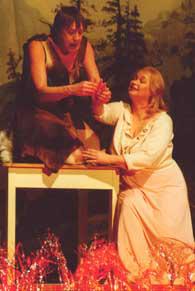
Act I. Via www.operdiva.com
All of the protagonists of this Götterdämmerung are in some way isolated. The Norns are headscarf-wearing women with shabby suitcases whose "sisterhood" is spontaneous, a bonding together of those who have nothing and no one else. Brünnhilde and Siegfried (Luana DeVol and Albert Bonnema) have their domestic idyll (immaculate kitchen, and sex on the kitchen table) far from the haunts of man, with the fire flickering around them. When Waltraute (convincingly panicked Tichina Vaughn) appears, Brünnhilde is at first elated by her sister's approach (her own Valkyrie armor was dug out of a recess to be given to Siegfried as he leaves.) But their conversation is a travesty of being unable to access each other's worlds; Brünnhilde (in dress, apron, and sensible shoes) tries to play hostess, and is offended by her sister's indifference. The woeful miscommunication and manipulation of the Gibichungs, then, appears as a parallel, rather than a sharp contrast, to the world of the mountains. The relations among the three siblings are fraught with tension awkwardly expressed, and still more awkward attempts at reconciliation and rapprochement. Hernan Iturralde gave a wretchedly pathetic Gunther, who became progressively more likable as events spiraled out of his control. Roland Bracht's Hagen covered equal insecurity with the urbane brutality of a businessman. Gutrune--and I never imagined I would say this--emerged as my favorite character, in the hands of Eva-Maria Westbroek. Her Gutrune was a warmhearted, intelligent woman used as a political pawn, but eager for a measure of independence, and new experience, through a relationship with Siegfried. (Really Shameful Confession: I have usually thought of Gutrune as having about half a brain, and less personality.)
Doom, then, is impending from the outset, and Siegfried's sinister costuming in a suit instead of his furs was only a symbol of what the emotional dynamics made inevitable. The horror of his disguised appearance before Brünnhilde was impressively registered and sung by DeVol. When she is brought, with her hands tied, before the Gibichungs, Siegfried welcomes her with a Bundt cake; Gutrune is holding Notung (at her side, at first, but balanced and ready for a blow when threatened.) Watching Westbroek's face during the subsequent scene, I think, could have told a stranger to the opera what was going on. Brünnhilde is abandoned when the festivities begin, still bound and despairing outside the hall. Gutrune brings her another cake, leaving it on the threshold when she won't take it. In the scene between the brothers and Brünnhilde, DeVol comes across as more worn down than fulminating with rage, wearily reminiscing about her relationship with Siegfried. She is no more than dully horrified when Hagen states his plan; for her the worst has already happened. The Rhinemaidens appear on a miniature stage, where Siegfried sits for their conversation and his subsequent narrative to the Gibichungs. The bear he's been chasing is sentient, and bites off the Norns' thread when Siegfried refuses to give up the ring. (When the Rhinemaidens threaten with the Norns' music, they also don their headscarves.) Siegfried is the adored hero for whose favor all strive; when Hagen kills him, he sinks forward into Gunther's arms. Not only schmerzergriffen at Siegfried's side, Gunther cradles the dying man with anguished tenderness. The Gibichungs cover him with their coats, both, I think, as an act of compassion, and as a desperate attempt to obscure the significance of what has happened.
The stage on which the Rhinemaidens have frolicked rotates, with Hagen standing alone at its edge, during the Trauermarsch. The hall of the Gibichungs turns out to be behind the backdrop of river and reeds, which continues to sparkle incongruously until Brünnhilde yanks out its switch on her entrance. Poor Gutrune's nightmare was, actually, horrifying. She painstakingly arranges her wedding veil as the top layer of Siegfried's makeshift shroud. I was gratified that Brünnhilde and Gutrune got a moment of reconciliation: after Gutrune realizes the deception that has been practiced, she rushes to embrace Brünnhilde, and sobs uncontrollably in her arms. Poor thing. Brünnhilde returns her embrace, but then ushers the still-assembled Gibichungs out, slowly, as she sings the mourning worthy of her hero. I think the world only ends in Brünnhilde's head. After all the others are gone (including the dead Gunther,) she takes Siegfried's hand, and raises him from beneath the Gibichungs' garments, and he walks offstage. Brünnhilde is left alone to sing. A projection screen falls, and all the audience sees for the last minutes of music is the libretto's description of the crumbling universe. Now, I don't want to whine about this. If your Götterdämmerung is about communication problems, having the world end would seem oddly tacked-on. But what does happen? Are the Gibichungs changed by their experiences? What does Brünnhilde do? I was a little disappointed that Konwitschny left these questions hanging and turned up the house lights instead. But maybe that's an answer in itself.

